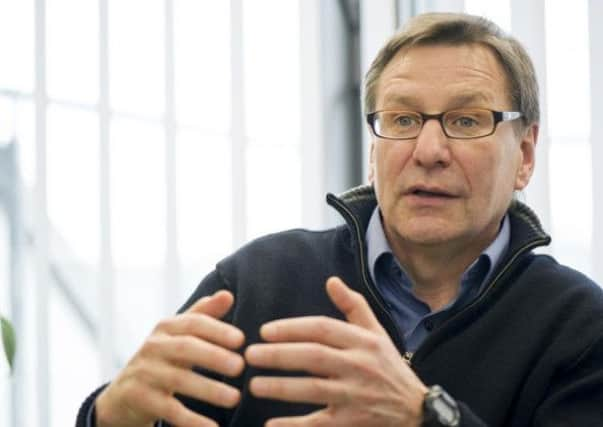Cancer treatment hope for terminal patients


Scientists have hailed a major breakthrough in a study of participants with a form of blood cancer known as acute lymphoblastic leukaemia (ALL), where 94 per cent of patients with just months to live saw their symptoms vanish completely.
Patients with other blood cancers had response rates greater than 80 per cent and more than half of those in the clinical trials went into complete remission.
Advertisement
Hide AdAdvertisement
Hide AdThe results were described as “a potential paradigm shift” in cancer treatment, by lead scientist Professor Stanley Riddell, from the Fred Hutchinson Cancer Research Center in Seattle.
He told the American Association for the Advancement of Science (AAAS) annual meeting in Washington DC: “These are in patients that have failed everything.
“Most of the patients in our trial would be projected to have two to five months to live.
“This is extraordinary. This is unprecedented in medicine to be honest, to get response rates in this range in these very advanced patients.”
Advertisement
Hide AdAdvertisement
Hide AdHowever, Prof Riddell admitted it was not clear how long patients would remain in remission.
The technique involves removing a type of immune cells from patients known as T-cells, then tagging them as “receptor” molecules that target cancer and infusing them back in the body.
This engineers the T-cells to work as if they are targeting flu or another form of infection.
Scientists screened specially bred genetically engineered mice to create the targeting molecules, which are known as chimeric antigen receptors (Cars).
Advertisement
Hide AdAdvertisement
Hide AdOnce attached to the T-cells, the molecules reduce the chances of the cancer being able to shield itself from the immune system.
Immunotherapy has already been identified as a promising treatment for conditions such as multiple sclerosis, and there is work under way to bring it into widespread clinical use for cancer and infectious diseases.
Cancer campaigners praised the research, which provides hope that immunotherapy could save lives in the future.
Dr Kat Arney, Cancer Research UK’s science information manager, said: “Engineering a patient’s own immune cells to fight cancer is an exciting prospect, and the results from this relatively small study are a tantalising demonstration that this could help treat some people with blood cancers like leukaemia or lymphoma.
Advertisement
Hide AdAdvertisement
Hide Ad“The treatment comes with a risk of potentially severe side effects, and doesn’t yet work for all patients.
“So we still need more results from more trials – including those that Cancer Research UK is funding – to know for sure how well they work, and whether they can be used in other cancers too.
“But there’s a lot of hope that this type of therapy could save lives in the future.”
One of the studies saw around 35 patients with ALL treated with Cars-modified T-cells and 94 per cent experienced complete remission, where their symptoms disappeared.
Advertisement
Hide AdAdvertisement
Hide AdGoing into remission does not mean that the patient is entirely cured, as the symptoms could return.
Another study into around 40 patients with lymphoma, another form of blood cancer, revealed more than half went into remission.
Response rates of more than 80 per cent were seen in one group with non-Hodgkin’s lymphoma.
Patients with chronic lymphocyte leukaemia showed similar results.
Advertisement
Hide AdAdvertisement
Hide AdThe technique has only been tried on patients with blood cancers but the team hopes that the studies could progress to patients with solid tumours.
There were problems with the research as seven patients suffered complications from the T-cells, triggering a powerful immune response known as cytokine release syndrome (sCRS).
Two of the participants died and others needed treatment in intensive care.
The scientists are now trying to find ways to reduce the risk of sCRS.
Advertisement
Hide AdAdvertisement
Hide AdThe immune system can often fail to recognise cancer cells, which evolve to conceal their identity.
Prof Riddell said: “We have a long way to go.
“The response is not always durable, some of these patients do relapse, we are cognisant of that. But the early data is unprecedented.”
He added: “I think immunotherapy has finally made it to a pillar of cancer therapy.
“Much like chemotherapy and radiotherapy, it’s not going to be a save-all, it’s going to find its applications in certain sub-types of tumours in certain patients.”
However, the trials are certain to offer hope to people diagnosed with the disease.